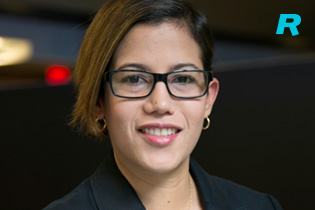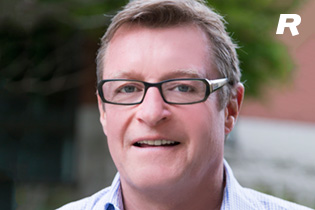
By all appearances, a few years ago
Silene Gomez (MBA ’18) seemed to be living an ideal life. She had a promising career working in the oil and gas industry, earning a solid living and putting her degree in mechanical engineering to good use.
Still, she had a nagging feeling that something wasn’t quite right.
“As someone who had always been passionate about the environment, I couldn’t justify the work I was doing any longer,” she explains.
It was time for a change. Today, Gomez, who is pursuing the Sustainability major in the MBA program at Rotman, is coaching businesses and leaders on how to run profitable ventures while making positive contributions to society.
“People are waking up to the fact that it’s no longer just about profit.”
Silene Gomez, MBA ’18
Her independent study projects have involved designing strategies for supermarkets and chemical engineering companies. She’s met with CEOs and senior managers across all sectors who are making sustainability a priority. And as president of Rotman Net Impact, a student-led group focused on sustainability, she’s inspiring her classmates to think more thoughtfully about how to blend socially-conscious and clean energy practices into their professional work.
“People are waking up to the fact that it’s no longer just about profit,” she says. “Sustainability in business is the next big thing. It’s going to cut across every industry and every sector. Now it’s just a matter of learning how to implement these changes effectively.”
Sustainability at Rotman
In many ways, Rotman is the ideal place to learn about how to do business the right way. The School, which is home to the Michael Lee-Chin Family Institute for Corporate Citizenship, works directly with organizations — including RBC Financial Group and Sun Life Financial — in developing corporate social responsibility policies.
And the group is spearheading exciting work in impact investing, including co-launching Open Impact, an online platform that allows users to identify investment opportunities that involve socially and environmentally sound business practices.
At the core of the institute’s mission is funding Rotman research that addresses big questions in sustainability. For example, Professor Alexander Dyck, one of the institute’s research fellows, is examining the role of investors in driving corporate social responsibility. Another fellow, Professor András Tilcsik has explored and published a new book on how certain business practices and procedures have led to large-scale corporate meltdowns. Professor Katherine DeCelles, also a fellow with the institute, is actively researching “buycotts” and political consumerism, in addition to her work on inclusiveness in the workplace.
Beyond this, Rotman faculty have been invited to speak about a range of sustainability issues at major academic conferences. Their insights have been published in academic journals and covered by media outlets. Understandably, these issues are a top concern for many investors and leaders, now more than ever.
“We’re seeing a shift in how we think about business,” says Rod Lohin, executive director of the institute. “It’s no longer enough for companies to be reactive about social issues or the environment.”
Investors aren’t going to tolerate the status quo, he says.
“For many organizations, their next big business challenge — and opportunity —will be to prove that they are operating in a way that makes the world a better place.”
Getting their hands dirty
 For many students, the hands-on approach to learning about sustainability was a major reason for choosing Rotman.
For many students, the hands-on approach to learning about sustainability was a major reason for choosing Rotman.
Regardless of the type of industry or role students pursue after graduation, sustainability will factor into their work, says Professor Richard Blundell, who teaches many courses at the School, including Sustainability Strategy, in the MBA, EMBA and GEMBA programs. In addition to the Innovation Study Tour to Silicon Valley, Blundell also supervises Sustainability Independent Study Projects, in which student teams work with industry clients on strategic sustainability initiatives.
“Today it’s impossible to design a successful business or startup that isn’t sustainable.”
– Richard Blundell, Adjunct Professor
“The future is not just about technology or apps, but innovation. Innovation requires developing business models that meet financial targets and also produce positive social, environmental and governance outcomes.”
For his classes, students step out of the classroom to tour social ventures and startups. And he supervises projects that involve students teaming up with industry partners to design go-to-market strategies and business models that align with social and environmental purposes.
“Today it’s impossible to design a successful business or startup that isn’t sustainable,” explains Blundell, who gained experience in the field by launching several new ventures. “Consumers and investors are pushing back and demanding that today’s companies have a social purpose.”
It was through speaking with Blundell and learning more about the School’s increasing focus on sustainability that won Gomez over.
She’s seen her classmates successfully progress to the final rounds for the Hult Prize, an international competition that challenges business students to develop solutions for pressing global issues, including food security, energy and access to education. Others are actively involved with the MIINT impact investing program — an experiential program founded at Wharton Business School — that challenges students to identify and work with a socially-focused organization in developing a pitch for further funding.
Gomez and others on the Net Impact team have helped establish a mentorship program, which connects Toronto-based leaders with MBA students who are interested in social investing and sustainability strategy.
“Rotman has grown a lot,” she says. “We’ve made impressive progress over the past two years in terms of engaging in conversations and with industry. It’s been exciting to be a part of this movement forward.”